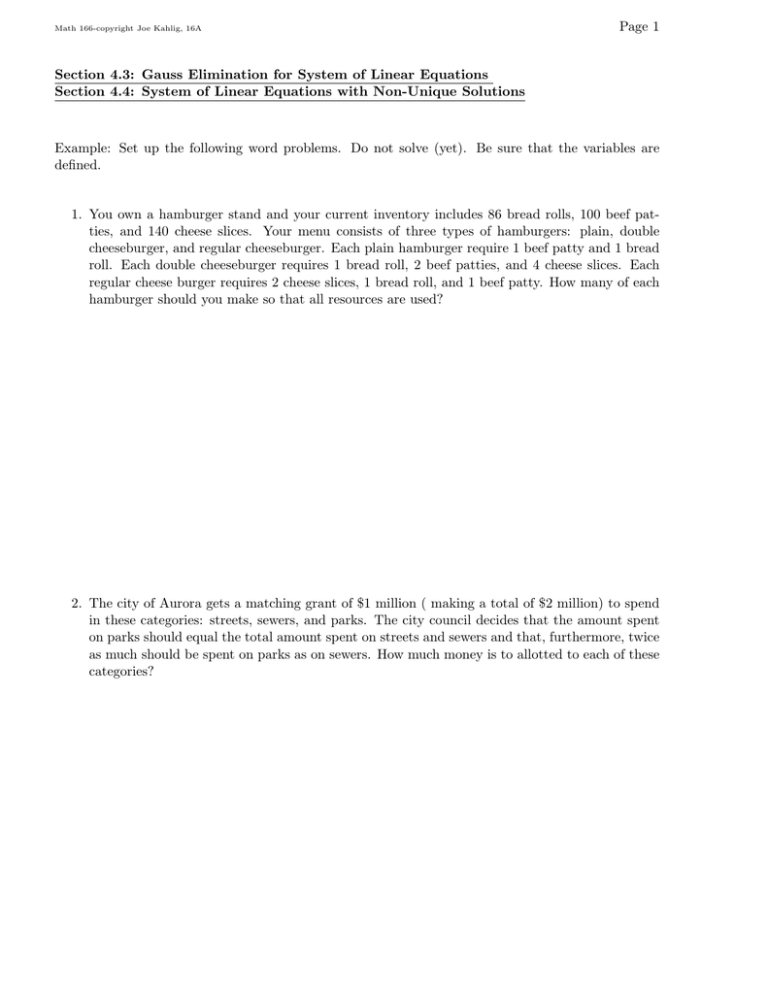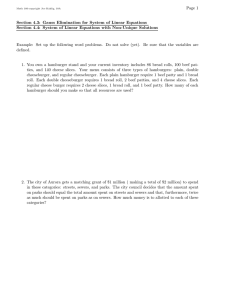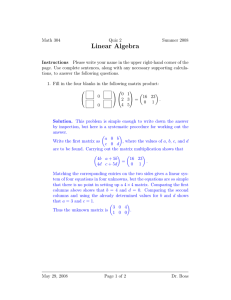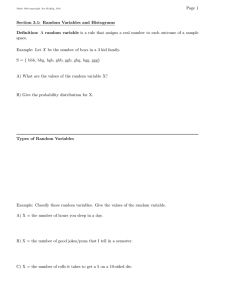Page 1 Section 4.3: Gauss Elimination for System of Linear Equations
advertisement

Math 166-copyright Joe Kahlig, 16A Page 1 Section 4.3: Gauss Elimination for System of Linear Equations Section 4.4: System of Linear Equations with Non-Unique Solutions Example: Set up the following word problems. Do not solve (yet). Be sure that the variables are defined. 1. You own a hamburger stand and your current inventory includes 86 bread rolls, 100 beef patties, and 140 cheese slices. Your menu consists of three types of hamburgers: plain, double cheeseburger, and regular cheeseburger. Each plain hamburger require 1 beef patty and 1 bread roll. Each double cheeseburger requires 1 bread roll, 2 beef patties, and 4 cheese slices. Each regular cheese burger requires 2 cheese slices, 1 bread roll, and 1 beef patty. How many of each hamburger should you make so that all resources are used? 2. The city of Aurora gets a matching grant of $1 million ( making a total of $2 million) to spend in these categories: streets, sewers, and parks. The city council decides that the amount spent on parks should equal the total amount spent on streets and sewers and that, furthermore, twice as much should be spent on parks as on sewers. How much money is to allotted to each of these categories? Math 166-copyright Joe Kahlig, 16A Page 2 3. Link has $7,000 to invest. He decides to invest in three different companies. The QX company costs $25 per share and pays dividends of $0.75 per share each year. The RY company costs $40 per share and pay dividends of $1.50 per share each year. The KZ company costs $15 per share and pays $2.00 per share per year in dividends. Link wants to have twice as much money in the RY company as in the KZ company. Link also wants to earn $352 in dividends per year. How much should Link invest in each company to meet his goals? 4. Link has $7,000 to invest. He decides to invest in three different companies. The QX company costs $25 per share and pays dividends of $0.75 per share each year. The RY company costs $40 per share and pay dividends of $1.50 per share each year. The KZ company costs $15 per share and pays $2.00 per share per year in dividends. Link wants to have twice as much money in the RY company as in the KZ company. Link also wants to earn $352 in dividends per year. How much should Link invest in each company to meet his goals? Page 3 Math 166-copyright Joe Kahlig, 16A 5. A brokerage firm packaged blocks of blue-chip stocks, bonds and high-risk stocks into three portfolios, which it offers to its customers. The makeup of each portfolio is given in the table. A customer wants eight blocks of blue-chip stocks, 11 blocks of bonds, and nine blocks of high-risk stocks. How many of each portfolio should the customer purchase? Portfolio I II III blue chip stocks 1 block 2 blocks 4 blocks bonds 4 blocks 1 block 2 blocks high-risk stocks 3 blocks 2 blocks 1 block Page 4 Math 166-copyright Joe Kahlig, 16A Solving System of Equations. Definition: An augmented matrix is a condensed method of representing a system of equations. Example: Represent the system of equations as an augmented matrix. 3x + 2y = 7 x + 4y = 10 Example: Give the system of equations represented by the augmented matrix. (Variables are listed in the first row.) x 1 3 y -4 4 z 2 2 10 20 Row Operations are used to manipulate an augmented matrix into a form (usually row reduced form) where the solution can easily be discerned. The three row operations are: 1) Swap Rows 2) Multiply a row by a non-zero number. 3) Add a multiple of one row to another row. Row Reduced Form (reduced row echelon form) 1. The first non-zero number in a row is a 1(called a leading one). 2. The leading one is the only non-zero number in a column. 3. The leading ones are in a diagonal like fashion from the upper left to the lower right. Example: Which of these matrices are in row reduced form? 1 A) 0 0 " C) 1 0 0 1 0 3 0 0 0 1 3 8 2 0 1 # 7 6 1 B) 0 0 0 1 0 3 0 2 5 6 7 0 1 0 0 0 0 3 7 10 1 D) 0 0 Math 166-copyright Joe Kahlig, 16A Example: Solve these system of equations. A) 3x + 2y = 7 x + 4y = 10 B) x + 2y − z = 2 y + 5z = 17 2x − y + 3z = 9 C) 3x + y − 9 = 0 x−y+z−4=0 3x + z − 11 = 0 4x − y + 2z = 15 Page 5 Math 166-copyright Joe Kahlig, 16A D) x + y − 3z = 0 2x − 3y + z = 1 4x − y − 5z = 1 E) x + 3y − z − 3w = 7 2x + 4y − 2w = 10 Page 6 Page 7 Math 166-copyright Joe Kahlig, 16A Example: The figure shows the flow of traffic during rush hour on a typical weekday. The arrows indicate the direction of traffic flow on each one–way road, and the average number of vehicles entering and leaving each intersection per hour appears beside each road. Fifth and Sixth Avenues can handle up to 2000 vehicles per hour without causing congestion, whereas the maximum capacity of each of the two streets is 1000 vehicles per hour. The flow of traffic is controlled by traffic lights installed at each of the four intersections. 5th st. 4th st. 2. Solve the system of equations and write the answer in parametric form. Place restrictions on the parameter. 3. Find two possible flow patters that would ensure that there is no traffic congestion. 350 500 1. Set up the system of equations that would model this problem. 1500 5th Av. x 1200 y w z 1400 6th Av. 1100 550 400 Math 166-copyright Joe Kahlig, 16A Example: Give the solution for this problem. x = the number of small drinks y = the number of medium drinks z = the number of large drinks x 1 0 0 y 0 1 0 z -1 4 0 -5 47 0 Page 8



